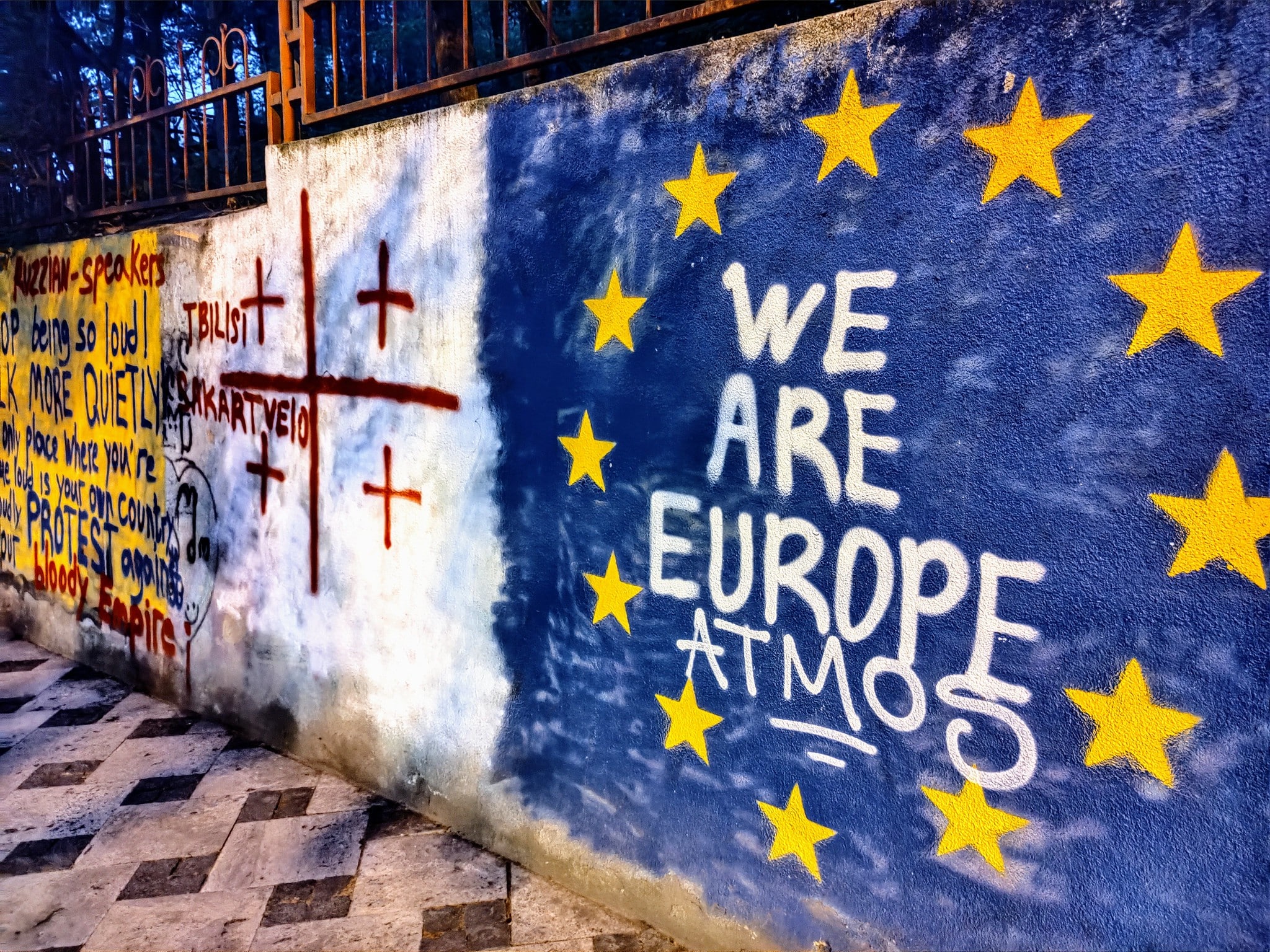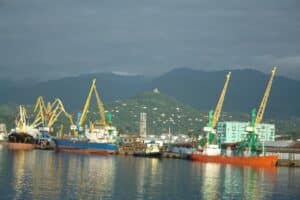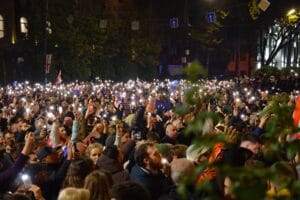Photo: Graffiti in Tbilisi in April-May 2024 (source: Jelger Groeneveld, Flickr)
On June 3, the notorious foreign agent law was officially adopted by the Georgian parliament. A last attempt to stop it by Saloma Zourabichvili, Georgias EU-leaning president, was overruled by the Georgian Dream parliamentary majority. The law, which closely resembles Russia’s foreign agent law, obliges all civil society organizations receiving more than 20% of their funding from abroad to register as ‘pursuing the interests of a foreign power’. Critics expect the law to restrict media freedom and help the government to muzzle civil society.
The new law was re-introduced in April, after a failed attempt in 2023. Since then, massive protests have taken place, mainly in the capital Tbilisi, with tens of thousands of Georgians taking to the streets for weeks on end. FMS trainer Rowdy Boeyink just returned from Georgia and speaks about his experiences in the country during this time of great political unrest. He experienced ‘a mood of hope and anger. Hope because people still believe in EU accession, anger because people were genuinely surprised by the re-introduction of the new law and see their hopes dwindle.’
The atmosphere
Although the protests had been taking place in Tbilisi for weeks on end, the city appeared relatively calm. ‘I expected a more tense atmosphere in the city, but in many places it was business as usual,’ Boeyink says. ‘You do see a lot of stalls that sell EU flags, socks and stuff like that around the national parliament. Everything is about the EU there,’ he adds.
But if you pay close attention, there are signs of protests all around the city. ‘You see references to what is happening everywhere, both pro-EU and anti-Russian graffiti is prominent throughout the city. Both Russian political influence as well as mass immigration of Russians which caused rents to skyrocket in the city, have caused discontent among the population.’ Many Russians are using Georgia as a safe haven to sit out what Boeyink refers to as the ‘Putin winter’ in Russia.
The protests
Protesters might have hoped the ruling Georgian Dream (GD) party would back down in the face of large scale protests like it did last year. But the party, under the leadership of notorious billionaire Bidzina Ivanishvili, decided to double down. Despite a presidential veto, the law was pushed through parliament. Protests were violently repressed by riot police in ominous white gas masks. ‘When we walked away from the protest we came across hundreds of riot police preparing to face the protesters. Considering that Georgia only has a riot police force of about 500 people, it seemed like at least 80% of them were called to suppress the protests in Tbilisi,’ says Boeyink.
Being present at several of those protests, He noticed that ‘they (the protests, red.) are really led by civil society actors, artists and writers. Not by members of the political opposition, as the image of Georgian politics remains severely tainted among the population.’ Although young people are very much involved in the demonstrations, ‘you really see young and old, male and female. People from all over Tbilisi seem to have come out to protest.’
Application of the law
The way in which GD pushed the new law through parliament suggests they want to start enforcing it as swiftly as possible. Whether they have the resources to do so is questionable. According to Boeyink, ‘the police force is relatively small and not yet reformed in a way that it can enforce such a law. The repressive police apparatus under Saakashvili was dismantled and it will take some time to set up such a system again. Among civil society, there is hope that it will take until the elections before the police is ready to effectively enforce.’ This will hopefully give Georgian civil society the opportunity to campaign against Georgian Dream without too much government encroachment.
Upcoming elections and divided opposition
Parliamentary elections are scheduled on 26 October of this year, likely becoming a decisive moment for both GD and the opposition. With the granting of candidate status to Georgia, the EU has ‘rewarded the majority of the population that seeks accession, while unmasking Georgian Dream as not really pursuant of EU membership’. If GD manages to retain its majority, it will almost certainly continue on its set path, which will ‘put Georgia’s EU accession on hold for at least the next 15 to 20 years’, according to Boeyink.
For the opposition, which is notoriously disunited, now is the moment to emerge as a concerted force against Russian influence and for accession to the European Union. ‘It really depends on the extent to which the opposition is able to work with the protesters but also with each other’ says Boeyink. Uniting the opposition, however, is easier said than done. The United National Movement (UNM), the largest opposition party, is still strongly associated with the authoritarian practices of its leader and former President of Georgia Mikhail Saakashvili. The FMS trainer considers this very problematic as ‘parties seeking to exploit discontent with the established political parties by jumping in the gap between GD and UNM could undermine overall opposition cohesion.’
Besides that, it remains to be seen whether the elections will be fair. Boeyink worries, as ‘GD has deeply permeated Georgian society and has strategically appointed loyalists within the school system, the police, health care and many other places.’ If there was ever a time for Georgia’s opposition to set aside personal quarrels and work towards multi-party democracy, it is now. With 4 months to go, seeking cooperation with civil society organisations and keeping the momentum of protests alive is crucial and will determine the future of the country.



